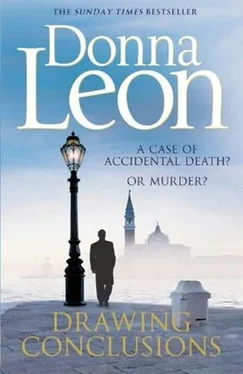Donna Leon - Drawing Conclusions
Здесь есть возможность читать онлайн «Donna Leon - Drawing Conclusions» весь текст электронной книги совершенно бесплатно (целиком полную версию без сокращений). В некоторых случаях можно слушать аудио, скачать через торрент в формате fb2 и присутствует краткое содержание. Жанр: Детектив, на английском языке. Описание произведения, (предисловие) а так же отзывы посетителей доступны на портале библиотеки ЛибКат.
- Название:Drawing Conclusions
- Автор:
- Жанр:
- Год:неизвестен
- ISBN:нет данных
- Рейтинг книги:3 / 5. Голосов: 1
-
Избранное:Добавить в избранное
- Отзывы:
-
Ваша оценка:
Drawing Conclusions: краткое содержание, описание и аннотация
Предлагаем к чтению аннотацию, описание, краткое содержание или предисловие (зависит от того, что написал сам автор книги «Drawing Conclusions»). Если вы не нашли необходимую информацию о книге — напишите в комментариях, мы постараемся отыскать её.
Conversations with the woman’s son, her upstairs neighbour, and the nun in charge of the old-age home where she volunteered, do little to satisfy Brunetti’s nagging curiosity. With the help of Inspector Vianello and the ever-resourceful Signorina Elettra, Brunetti is determined to get to the truth and find some measure of justice.
Insightful and emotionally powerful, Drawing Conclusions reaffirms Donna Leon’s status as one of the masters of literary crime fiction.
***
In the opening pages of a debut novel nearly two decades ago, a nasty conductor was poisoned during intermission at the famous La Fenice opera house in Venice. The Questura sent a man to investigate, and readers first met Commissario Guido Brunetti.
Since 1992's Death at La Fenice, Donna Leon and her shrewd, sophisticated, and compassionate investigator have been delighting readers around the world. For her millions of fans, Leon's novels have opened a window into the private Venice of her citizens, a world of incomparable beauty, family intimacy, shocking crime, and insidious corruption. This internationally acclaimed, best-selling series is widely considered one of the best ever written. Atlantic Monthly Press is thrilled to be publishing Drawing Conclusions, the 20th installment, in Spring 2011.
Late one night, Brunetti is suffering through a dinner with Vice Questore Patta and his nasty Lieutenant Scarpa when his telefonino rings. A old woman's body has been found in a Spartan apartment on Campo San Giacomo dell'Orio. Her neighbor discovered it when she went to pick up her mail, after having been away in Palermo. Brunetti sees some signs of force on the old woman-the obvious wound on her head, what could be a bruise near her collarbone-but they could just as easily have been from the radiator near where she fell. When the medical examiner rules that the woman died of a heart attack, it seems there is nothing for Brunetti to investigate. But he can't shake the feeling that something may have created conditions that led to her heart attack, that perhaps the woman was threatened.
Brunetti meets with the woman's son, called into the city from the mainland to identify the body, her upstairs neighbor, and the nun in charge of the old age home where she volunteered. None of these quiet his suspicions. If anything, the son's distraught, perhaps cagey behavior, a scene witnessed by the neighbor, and the nun's reluctance to tell anything, as well as her comments about the deceased's "terrible honesty,' only heighten Brunetti's notion.
With the help of Inspector Lorenzo Vianello and the ever-resourceful Signorina Elettra Zorzi, perhaps Brunetti can get to the truth, and find some measure of justice.
Like the best of her beloved novels, Drawing Conclusions is insightful and emotionally powerful, and it reaffirms her status as one of the masters of literary crime fiction.












